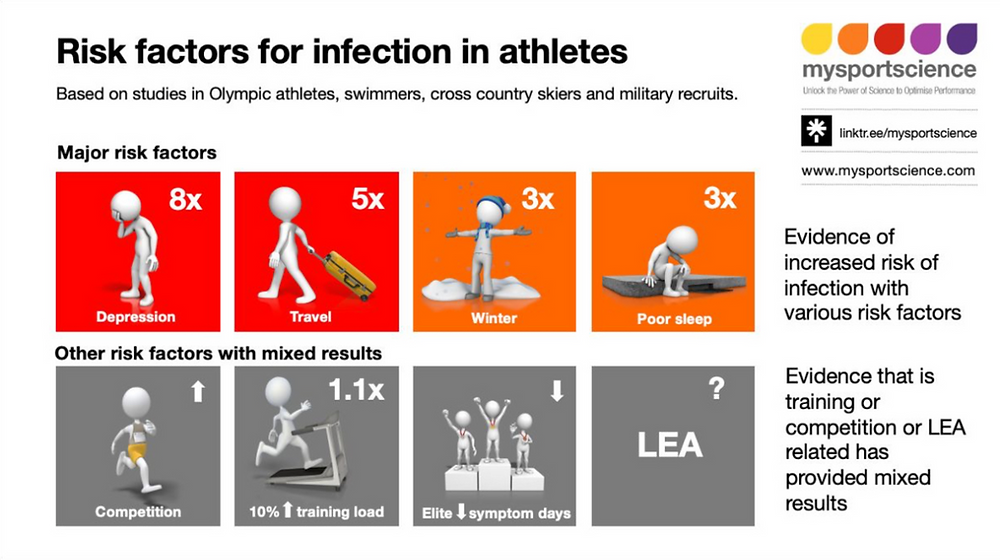In the realm of endurance sports, the intersection of nutrition, immune health, and performance is vital yet often overlooked. Recent discourse around Relative Energy Deficiency in Sport (REDs) and low energy availability (LEA) has sparked crucial conversations about their potential impact on immune function and, ultimately, athletic performance. While the relationship between exercise and immune status has been historically characterized by the fear of immunosuppression, recent research suggests that the situation is more nuanced than once thought.
It’s well-established that elite athletes who consistently train in demanding environments face unique challenges regarding illness and recovery. Upper respiratory and gastrointestinal infections can compromise an athlete’s training schedules and competition readiness, warranting a deeper investigation into how conditions like LEA might exacerbate these issues. What remains evident is that while athletes often strive to maintain optimal lean body compositions, the quest for leanness can sometimes overshadow the need for adequate energy to support physiological functions, including immune health.
For those engaged in endurance sports, a critical aspect of training is how effectively you manage your nutrition. This goes beyond merely consuming calories; it’s about timing, quality, and the composition of those nutrients. Carbohydrates, fats, and proteins serve as vital macronutrients that play roles in fueling physical exertion but also directly influence immune function and recovery. Specifically, carbohydrates are paramount for endurance athletes, as they support glycogen replenishment post-exercise, which is essential for optimal metabolic recovery and subsequent performance. Pairing carbohydrate intake with protein shortly after training sessions can bolster muscle repair and facilitate a more robust immune response, ensuring that athletes are not just fueling their training but also supporting their body’s defense mechanisms.
Moreover, the timing of nutrition intake can significantly affect gut tolerance. Consuming the right nutrients at the right time can mitigate gastrointestinal distress—an all-too-common challenge for endurance athletes, especially during long-duration events. A careful selection of fueling strategies that include easily digestible carbohydrates, adequate hydration, and electrolytes is essential in maintaining gut integrity and enhancing performance. Athletes should focus on assessing their personal tolerance levels during training, as gastrointestinal issues can lead to a dramatic decrease in performance.
Another layer to consider is supplementation. Micronutrients such as vitamins C and D have garnered attention for their roles in immune function. Although athletes frequently assume they can get all necessary nutrients from a well-balanced diet, the truth is that when training volume and intensity increase, the requirements for certain vitamins and minerals can also rise. Therefore, supplementing with these key nutrients should be taken into consideration, especially when training loads are high, or dietary intake might not meet the elevated needs due to restrictive eating patterns often observed in athletes dealing with LEA.
Hydration is equally paramount in both performance and immune health. Dehydration can increase the risk of illness and hinder recovery, thus impacting overall athletic capacity. Maintaining proper hydration levels, particularly during long training sessions and competitions, not only helps in sustaining physical performance but also supports optimal physiological function and immune response. Incorporating electrolyte drinks during enduring activities ensures that athletes are replenishing lost nutrients while avoiding potential cramping or fatigue associated with dehydration.
It’s critical to understand that while LEA may be associated with increased illness in athletes, the causation is complex. Studies indicate that psychological factors, including stress, anxiety, and sleep disturbances, often present in athletes striving for high performance, can influence immune responses. This connection highlights the need for a holistic approach to athlete health—one that incorporates strategies for mental health and recovery alongside nutritional tactics. Recognizing the significance of recovery and implementing strategies such as active recovery sessions, restorative practices like yoga or meditation, and ensuring adequate sleep can create a more resilient athlete. Ignoring these aspects can lead to a cumulative stress load that negatively impacts immune function.
Ultimately, for endurance athletes, the takeaway should be clear: prioritize a multifaceted strategy for maintaining immune health and optimizing performance. This means ensuring energy availability is sufficient through meticulous nutrition planning that includes adequate macronutrient timing, gut-friendly fueling practices, appropriate hydration, and strategic supplementation. Pay attention not just to physical training demands but also to psychological well-being and recovery protocols. By adopting a well-rounded approach, athletes can enhance both their performance outcomes and their resilience against the illnesses often encountered in high-demand training schedules.
